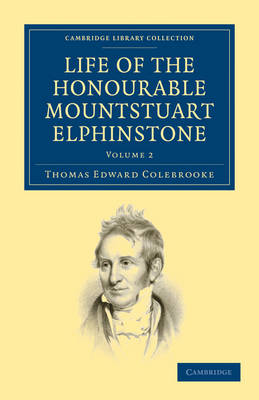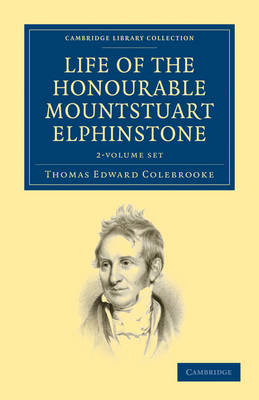Cambridge Library Collection - South Asian History
1 primary work • 4 total works
Volume 2
Mountstuart Elphinstone (1779-1859) was appointed through family influence to the East India Company, and arrived in India in 1796. He learnt Persian, and developed an interest in Indian literature and politics. After postings in Afghanistan and Poona he became Governor in 1819 of the recently acquired territory that became known as the Bombay Presidency. His biographer also had connections to India. Thomas Edward Colebrooke (1813-1890) was the son of British administrator and Sanskrit scholar Henry Thomas Colebrooke (1765-1837), and although he lived in England and served as an M. P., Colebrooke remained interested in colonial affairs. He had written about Elphinstone's life in 1861 for the Journal of the Royal Asiatic Society and subsequently expanded his work into these two volumes, published in 1884. Volume 2 covers his years in Poona and Bombay, and his eventual return to England.
Life of the Honourable Mountstuart Elphinstone: Volume 1
by Thomas Edward Colebrooke
Published 7 September 2011
Mountstuart Elphinstone (1779-1859) was appointed through family influence to the East India Company, and arrived in India in 1796. He learnt Persian, and developed an interest in Indian literature and politics. After postings in Afghanistan and Poona he became Governor in 1819 of the recently acquired territory that became known as the Bombay Presidency. His biographer also had connections to India. Thomas Edward Colebrooke (1813-1890) was the son of British administrator and Sanskrit scholar Henry Thomas Colebrooke (1765-1837), and although he lived in England and served as an M. P., Colebrooke remained interested in colonial affairs. He had written about Elphinstone's life in 1861 for the Journal of the Royal Asiatic Society and subsequently expanded his work into these two volumes, published in 1884. Volume 1 examines Elphinstone's childhood, education and early career, covering the period up to 1817.
Life of the Honourable Mountstuart Elphinstone: Volume 2
by Thomas Edward Colebrooke
Published 7 October 2011
Mountstuart Elphinstone (1779-1859) was appointed through family influence to the East India Company, and arrived in India in 1796. He learnt Persian, and developed an interest in Indian literature and politics. After postings in Afghanistan and Poona he became Governor in 1819 of the recently acquired territory that became known as the Bombay Presidency. His biographer also had connections to India. Thomas Edward Colebrooke (1813-1890) was the son of British administrator and Sanskrit scholar Henry Thomas Colebrooke (1765-1837), and although he lived in England and served as an M. P., Colebrooke remained interested in colonial affairs. He had written about Elphinstone's life in 1861 for the Journal of the Royal Asiatic Society and subsequently expanded his work into these two volumes, published in 1884. Volume 2 covers his years in Poona and Bombay, and his eventual return to England.
Life of the Honourable Mountstuart Elphinstone 2 Volume Set
by Thomas Edward Colebrooke
Published 31 March 2011
Mountstuart Elphinstone (1779-1859) was appointed through family influence to the East India Company, and arrived India in 1796. He learnt Persian, and developed an interest in Indian literature and politics. After postings in Afghanistan and Poona he became Governor in 1819 of the recently acquired territory that became known as the Bombay Presidency. His biographer, Thomas Edward Colebrooke (1813-90), was the son of British administrator and Sanskrit scholar Henry Thomas Colebrooke (1765-1837), and although he lived in England and served as an M. P., Colebrooke remained interested in colonial affairs. He had written about Elphinstone's life in 1861 for the Journal of the Royal Asiatic Society and subsequently expanded his work into these two volumes in 1884. Volume 1 examines Elphinstone's childhood, education and early career, covering the period up to 1817. Volume 2 covers his years in Poona and Bombay, and his eventual return to England.


